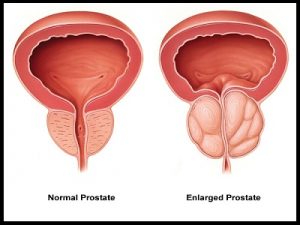The prostate is a small, muscular gland in men that is located below the bladder and surrounds the urethra (the tube that carries urine and semen out of the body). It produces a fluid that nourishes and protects sperm, and the fluid is expelled during ejaculation. The prostate is an important part of the male reproductive system and can be prone to health issues, such as prostate enlargement (benign prostatic hyperplasia) or prostate cancer. Regular check-ups and screenings can help detect and treat any issues with the prostate.

Prostate enlargement, also known as benign prostatic hyperplasia (BPH), is a common condition in ageing men, in which the prostate gland grows in size. This growth can squeeze the urethra and cause urinary symptoms, such as a weak urine stream, difficulty starting and stopping urine flow, frequent urination (especially at night), an urgency to urinate, and a feeling that the bladder has not been completely emptied. While prostate enlargement is not cancerous, it can impact the quality of life and may lead to other urinary problems. The exact cause of prostate enlargement is not known, but it is thought to be related to hormonal changes that occur as men age. Treatment options for BPH can include lifestyle changes, medication, and in severe cases, surgery.
Prostate cancer is a type of cancer that occurs in the prostate gland, a small walnut-shaped organ that is part of the male reproductive system. The prostate gland produces fluid that makes up a portion of semen and helps to nourish and transport sperm. Prostate cancer is the most common type of cancer among men in the United States, and the risk of developing prostate cancer increases with age. Symptoms of prostate cancer may include frequent urination, weak urine flow, pain or burning during urination, and difficulty starting or stopping urination. If not detected and treated early, prostate cancer can spread to other parts of the body and become difficult to treat. Treatment options for prostate cancer include surgery, radiation therapy, hormone therapy, and chemotherapy. In some cases, active surveillance or watchful waiting may be recommended if the cancer is slow-growing and not causing symptoms.
Preventing prostate disease can be achieved through several measures:
Healthy Diet: Eating a balanced diet that is high in fruits, vegetables, and whole grains, and low in fat, can reduce the risk of developing prostate cancer.
Exercise: Regular exercise, such as brisk walking, can help reduce the risk of prostate disease.
Maintain a healthy weight: Being overweight and obese is linked to an increased risk of developing prostate cancer, so maintaining a healthy weight can help reduce the risk.
Limit alcohol and tobacco consumption: Heavy drinking and smoking can increase the risk of developing prostate cancer.
Regular check-ups: Regular check-ups, especially after the age of 50, can help detect prostate disease early, making it easier to treat.
Medications: Certain medications, such as 5-alpha reductase inhibitors, can help reduce the risk of developing prostate disease.
There have been several famous people who have been publicly open about their experience with prostate cancer. Some notable examples include:
Robert De Niro - the famous Hollywood actor who was diagnosed with prostate cancer in 2003.
Joe Torre - the former New York Yankees manager, and Major League Baseball executive, was diagnosed with prostate cancer in 1999.
John Stossel - the journalist and former news anchor who was diagnosed with prostate cancer in 2015.
Billy Joel - the singer-songwriter was diagnosed with prostate cancer in 1997 and has since recovered.
Colin Powell - the former US Secretary of State, was diagnosed with prostate cancer in 2003.
These celebrities have helped raise awareness about the importance of early detection and treatment of prostate cancer, and the need for men to get regular check-ups to monitor their prostate health.
Here are some frequently asked questions about prostate disease:
Q) What are the symptoms of the prostate disease?
Common symptoms of the prostate disease include difficulty urinating, weak or interrupted urine flow, frequent urination, especially at night, and pain or burning during urination.
Q) What causes prostate disease?
Prostate enlargement can be caused by hormonal changes as men age, while prostate cancer can develop from genetic mutations in the cells of the prostate gland. Prostatitis can be caused by bacterial infections.
Q) How is the prostate disease diagnosed?
The prostate disease can be diagnosed through physical exams, blood tests, biopsies, and imaging tests such as ultrasound or MRI.
Q) What are the treatments for the prostate disease?
Treatment options for prostate disease depend on the specific condition and can include medication, minimally invasive procedures, or surgery.
Q) What can be done to prevent prostate disease?
There is no sure way to prevent prostate disease, but maintaining a healthy lifestyle, including a balanced diet and regular exercise, can help reduce the risk of developing prostate problems. Regular screening and early detection can also improve outcomes for those with prostate disease.
Q) Are there any celebrities who have had prostate disease?
Yes, several well-known public figures, including former U.S. President Bill Clinton and film star Ben Stiller, have spoken publicly about their experiences with prostate cancer.
It's important to consult with a healthcare provider before making any changes to your diet or lifestyle to prevent prostate disease, this article is to spread awareness and should not be taken as medical advice




Comments
Post a Comment